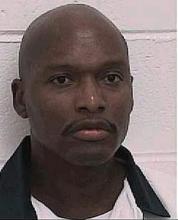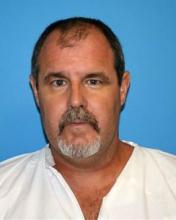Death Penalty

Despite protests not only from jurors who conivicted him but also from his victim’s family, Warren Hill, a 52-year-old mentally disabled man convicted of murder, is scheduled to be executed by lethal injection on July 23 in Jackson, Ga.
In 1991, a jury found Hill guilty in the bludgeoning to death a fellow inmate, Joseph Handspike, and sentenced him to death. Hill had been serving a life sentence for the 1986 killing of his girlfriend at the time of Handspike's death.
Hill has an I.Q. of about 70, leading a state judge to find him "mentally retarded" by a “preponderance of the evidence.”
While Georgia — as the rest of the United States — has banned the execution of mentally retarded inmates, the state has a stricter standard that requires proving mental retardation “beyond a reasonable doubt.” By that standard, the Georgia Supreme Court overruled the judge's finding of mental retardation, reversed the decision, and reinstated Hill’s death sentence, which originally had been set for today.

The campaign to abolish the death penalty has been freshly invigorated this month in a series of actions that supporters say represents increasing evidence that America may be losing its taste for capital punishment.
As early as this week, Gov. Dannel Malloy, a Democrat, is poised to sign a bill repealing the death penalty in Connecticut. A separate proposal has qualified for the November ballot in California that would shut down the largest death row in the country and convert inmates' sentences to life without parole.
Academics, too, have recently taken indirect aim: The National Research Council concluded last week that there have been no reliable studies to show that capital punishment is a deterrent to homicide.

North Carolina's Racial Justice Act was just a piece of legislation until this morning, when Judge Gregory Weeks set aside a death penalty sentence that had been meted out to Marcus Robinson in 1994.
At issue this morning was not whether Robinson was guilty of first-degree murder. At issue was whether “racial bias” had prevented the “fair and reliable imposition of the death penalty in North Carolina.”
Judge Weeks found that racism was indeed at work in Robinson’s sentencing. There is, Weeks said, “considerable evidence of the continuing effects of racial prejudice in the application of the death penalty.” Specifically, Weeks found that racism guided the selection of Robinson’s jury, thus compromising Robinson’s right to trial by impartial jury. In accordance with the Racial Justice Act, Robinson will now serve a term of life imprisonment without parole.
In the more than three decades since the national moratorium on the death penalty was lifted, there is no reliable research to determine whether capital punishment has served as a deterrent, according to a review by the National Research Council.
The review, partially funded by the Justice Department's National Institute of Justice, found that one of the major shortcomings in all previous studies has included "incomplete or implausible" measures of how potential murderers perceive the risk of execution as a possible consequence of their actions.
Another flaw, according to the review, is that previous research never considered the impact of lesser punishments, such as life in prison without the possibility of parole.

The United States has the highest incarceration rate in the world with 23 million behind bars. Bryan Stevenson of the Equal Justice Initiative, speaking from the Q Conference on Wedensday, said this high rate is inextricably tied to poverty, age, mental illness and race.
“In this country, the opposite of poverty is not wealth. The opposite of poverty is justice,” said Stevenson, a law professor at the New York University school of Law. “If we’re going to be concerned about ending poverty, we must be concerned about justice.”
There are many reasons to abolish the death penalty. Innocents on death row may be the most compelling.

CORRECTION: After our original post ran yesterday, we learned that there has been some confusion over the language of the current proposed language of the Ugandan anti-gay bill. In fact, the death penalty has not yet been dropped from the text of the bill.
According to news reports, a Ugandan Member of Parliament has introduced a revised bill that is expected to be acted on within a few days.

Census Shows 1 In 2 People Are Poor Or Low-Income; Evangelical Group Links Climate Change And Poverty; Rick Perry Stresses Values On Iowa Bus Tour Kick-Off; Occupy 2.0? Church Leaders Join Movement; The Looming Death Of The Death Penalty; Christ and Consumerism: 'Priceless' At What Price? (OPINION)

Democrats See Opening To Attract Religious Voters In 2012 Election; Does Inequality Matter?; From Occupy To Progressive Renewal: Demanding The Just Society; Occupy Movement A Reminder Of What We Value; The Annual 'War On Christmas' Shows How A Faith That Once United America Now Divides It; Religious Leaders Target Repeal Of N.C. Death Penalty Law; Gulnare Free Will Baptist Church: Kentucky Congregation Overturns Ban On Interracial Couples.
No one could stop Troy Davis' execution -- despite his apparent innocence.
Yesterday Oregon Gov. John Kitzhaber announced a moratorium on all executions in the state, declaring capital punishment to be a “perversion of justice.”
Oregon has carried out two executions in the last 47 years, both during Kitzhaber's tenure as governor.
With convicted murderer Gary Haugen facing the death penalty on Dec. 6 — coupled with the governor's growing frustration with the death penalty — Kitzhaber had had enough and halted Haugen's execution as well as any in the foreseeable future.
"I refuse to be a part of this compromised and inequitable system any longer and I will not allow further executions while I am governor," Kitzhaber said in The Oregonian.
Sparing Haugen’s life is not only a powerful victory for his family and loved ones, but also for anti-death penalty activists such as Naseem Rakha, who has devoted much of her career to writing about capital punishment as a journalist and novelist.

Tony Rackauckas, Orange County District Attorney, held a press conference to announce his intent to seek the death penalty for Scott Dekraai, who killed his ex-wife and seven others at Salon Meritage in Seal Beach on Oct. 12.
“There are some cases that are so depraved, so callous, so malignant that there is only one punishment that might have any chance of fitting the crime," said Rackauckas. “When a person, in a case like this, goes on a rampage and kills innocent people in an indiscriminate bloody massacre, I will of course seek the death penalty.”
He added, “This is the only way our society can get anything approaching justice for the victims, their families, the town of Seal Beach, and the larger community.”
If justice means putting Dekraai on a gurney and executing him, the victims, their families and everyone else hoping for that outcome should face the cold hard fact that they are in for a long wait.
The high cost of anti-immigration laws. Why candidates' faith matters. ABC News' exclusive interview with President Obama. U.S. Hispanics choosing churches outside Catholicism. Three U.S. Congressmen tour the Canadian tar sands. Who are the death penalty's most ardent supporters? Investors worth a collective $20 trillion (with a T!) call for urgent action on climate change. And God's economy.
 The news cycle often moves so quickly that very often big news stories are forgotten within a day, sometimes even more quickly.
The news cycle often moves so quickly that very often big news stories are forgotten within a day, sometimes even more quickly.
I prayerfully hope that this is not and will not be the case with the story of Pastor Youcef Nadarkhani, the Iranian Christian leader who has been sentenced to death for refusing to recant his religious beliefs and convert to Islam.
Arrested in 2009 on a charge of apostasy, he has spent two years in jail, with his wife also being jailed on similar charges last year.

Naseem Rakha, author of the 2009 novel The Crying Tree sees justice differently. Rakha, an award-winning journalist whose work has been featured on National Public Radio and elsewhere, has covered two death penalty cases in Oregon -- the only two in that state's history -- and has spent considerable time exploring the deeper story behind capital punishment, retributive justice and forgiveness.
"What I learned from talking to these victims is that there is a place, not called closure, not called moving on, but there is a place of empowerment," Rakha said in a recent interview with God's Politics. "Crime strips people of power, and there's nothing that the justice system or really even churches can give to you to replace that power. It is an act of wanting to sit down and meet with the person who strips that power from you that has transformed people's lives and gotten them to a point where they can forgive the act, because they see the perpetrator no longer as a monster, but as a human that has made a terrible mistake."

By the time someone figured out what happened, the deadline to appeal the denial of his post-conviction appeal had passed. So far, the state of Alabama has successfully argued that despite the mail room debacle, Maples should have been aware -- through his local counsel -- that the clock was ticking and that he just blew it.
Courts have struggled for years over the question of who should bear the penalty for a lawyer's mistakes or incompetence and the Maples case represents an extreme example of the problem of imputing the mistakes of a lawyer to the client.
 "Continuing a cycle of violence through state-sanctioned actions does not bring justice but only creates a culture of death and retribution. As a pro-life Christian, I believe the execution of Troy Davis shows a failure of moral leadership by both our country and the state of Georgia. The doubt surrounding the case of Troy Davis has served as a wake-up call to many in this country that our justice system is flawed and should not hold the power of life and death over any person. Justice should restore and heal, not destroy." -- Sojourners CEO Jim Wallis statement today, Friday Sept. 23
"Continuing a cycle of violence through state-sanctioned actions does not bring justice but only creates a culture of death and retribution. As a pro-life Christian, I believe the execution of Troy Davis shows a failure of moral leadership by both our country and the state of Georgia. The doubt surrounding the case of Troy Davis has served as a wake-up call to many in this country that our justice system is flawed and should not hold the power of life and death over any person. Justice should restore and heal, not destroy." -- Sojourners CEO Jim Wallis statement today, Friday Sept. 23
So what makes the Troy Davis case stand out from most other death penalty cases?
Serious doubt.
Not about whether the death penalty is the appropriate punishment for Davis or has been correctly applied.
The doubt raised in Davis' case is whether he committed the crime at all. And those questions about his guilt have prompted hundreds of thousands of people to raise their voices in opposition to his execution, most recently former FBI Director William Sessions who, in an op-ed in the Atlanta Journal-Constitution Friday, called on the Georgia Board of Pardons and Paroles to commute Davis' sentence to life in prison.
Last night, death was interrupted when the U.S. Supreme Court issued a stay of execution for a Texas man convicted of a double murder in Houston in 1995.
Duane Buck was set for execution by lethal injection sometime after 6 p.m., Thursday September 15 in Huntsville, Texas. His execution would have been the second this week and the 11th so far this year in Texas alone. Two more executions are scheduled for next week.